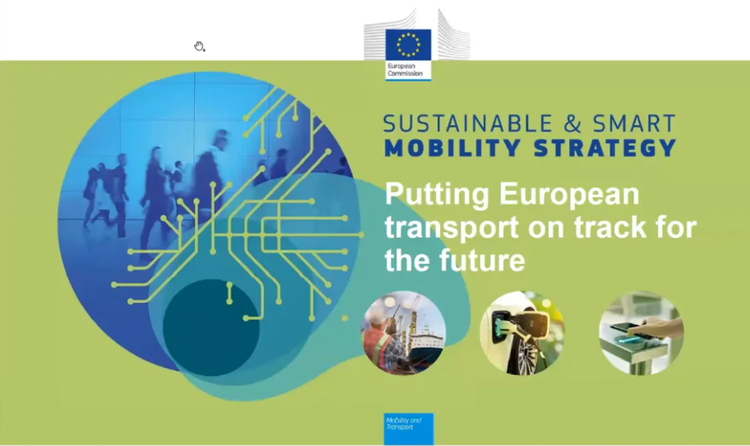The European Commission’s Smart and Sustainable Mobility Strategy took centerstage this morning as stakeholders and decisionmakers met virtually to discuss the challenges and opportunities to making mobility more sustainable, smart, and resilient at a debate hosted by the FMS – Forum for Mobility & Society.
Maja Bakran, Deputy Director-General at DG MOVE, in her keynote presentation addressed the three pillars of the Strategy – sustainable, smart, and resilient -, along with the flagship areas. When asked about the potential inclusion of road transport in the EU Emissions Trading System (ETS), she admitted that if the interinstitutional negotiations around the revision of the “Eurovignette” Directive do not succeed, the European Commission will have to look at other ways to decarbonize transport.
Stefan Back, Vice-president of TEN section at the European Economic and Social Committee, questioned whether the focus of the action plan on mainly technical measures is adequate to achieving the goals of the Strategy. Mr Back also regretted the strong focus on electrification and hydrogen, as he believes that a technological neutral approach is needed.
A panel debate involving MEP Ertug, Sigrid de Vries, Chris Hodder, Fazilet Cinaralp, Valerie Bouillon-Delporte, and Maja Bakran followed.
MEP Ismail Ertug, FMS Co-Chair, recalled the headlines of the Draft TRAN Report on the Strategy, highlighting that the inclusion of road transport in the ETS is not socially fair; instead, he would favor tackling decarbonization via direct legislation (e.g., CO2 emission targets).
Sigrid de Vries, Secretary General of CLEPA, highlighted that the COVID pandemic showed that personal mobility makes people feel safer, and keeping mobility accessible and affordable is key. She also called for technology-neutrality to be kept, as different technologies should be chosen depending on the mobility needs.
Chris Hodder, Public Affairs Manager at FIM, recalled that the Strategy does not address motorcycles at all, despite the importance that they have in our daily life, while stressing the resilience they have shown during the pandemic.
Fazilet Cinaralp, Secretary General at ETRMA, recalled the wish of the tyre manufacturers for supporting the transition towards low and zero emissions vehicles, which must be to be anchored on a new regulatory framework, while noting the opportunity for greening the current vehicle fleets.
Valerie Bouillon-Delporte, Hydrogen Ecosystem Director at Michelin, noted that hydrogen will be one of the essential components of clean mobility, and called for a roadmap that favors low carbon hydrogen.
In her closing remarks, MEP Henna Virkkunen, FMS Co-Chair, drew the attention of the audience to the need for legislators to keep a technological neutral approach to decarbonization. Likewise, MEP Virkkunen stressed the importance of using all the opportunities offered by digitalization, also noting the need for sustainable biofuels.
